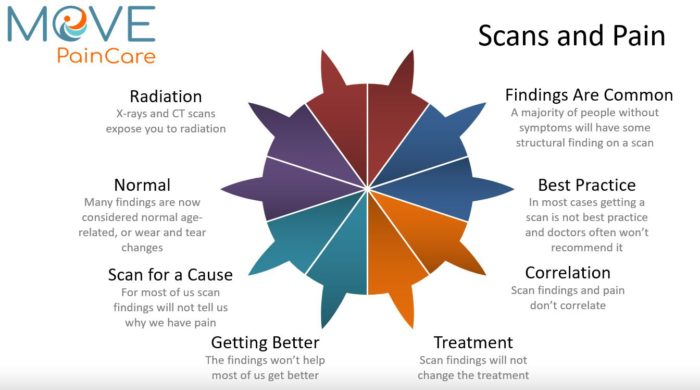
When The Scans Are Clean
Have you visited your doctor about back or shoulder pain, had a scan and been told that there is nothing that can be found to explain your symptoms?
That's a pretty common experience, but can be frustrating because you still have pain.
Research is showing us that we can no longer simply link an image finding to an experience of pain. That's good news when the scans are clean. It doesn't mean that nothing is happening or that your pain isn't real, it just means that there is probably a myriad of contributing factors that haven't been figured out yet. The good news is that tissue damage isn't one of them.
Having pain is a complex process, but there are certain contributors that we can have control over.
When Your Doctor Won't Order A Scan
More and more, doctors will not suggest you get a scan for a presenting musculoskeletal pain or movement restriction, especially if the presenting symptoms fall within certain parameters. At times that can be reassuring, other times it might seem dismissive of pain. However, your doctor is likely following best practice guidelines. Here's some information about why you or your doctor might consider a scan, and why they might not - Choose Wisely.
For most of us the findings on a scan will not help us deal with our experience of pain. They could even be harmful and make us worry about a problem, like a disc bulge, that isn't actually a problem but a normal wear and tear related change. The findings could even lead to surgery that research is revealing will often be unnecessary.
Repairing a structural change is possible and quite amazing, but is often unhelpful for pain and can sometimes lead to more pain.
When The Scans Show Something
Have you visited your doctor about back or shoulder pain, had a scan and been told there are findings that your doctor says don't explain your symptoms?
Findings like disc degeneration, arthritis, disc bulges and the like are common findings in people who have pain, and in people who don't. They are also snippets in time and don't reveal anything about the process itself, how long its been going on, how quickly or slowly. Coupled with your symptom presentation, these findings are likely to be considered normal age or wear related changes.
Your doctor may not seem too worried about a finding like disc degeneration, or even a bulge or herniation depending on the symptoms. That can sometimes seem dismissive but is based on pretty solid evidence that conservative treatments are likely to be more helpful for long-term recovery.
When You Have Pain Right Where The Scan Shows a Problem
That's not an unusual situation. Findings in scans are common. If we take low back pain as an example, then back pain is also very common (80% of us as some time in our lives will have an episode of back pain). This is one of the reasons we've historically blamed the pain on the findings.
That doesn' mean that the scan findings are not useful in every situation. Depending on the symptoms they may help explain a sudden bout of pain, especially in a younger person. Even then, the scan findings can only ever be one part of the picture. Information that may or may not be relevant in a given situation.
If you have a scan that shows a bulge, for instance, but the back pain goes away with time and conservative treatment, you still have the bulge. If, two years later you have the same kind of back pain it becomes easy to blame the disc bulge, even though for two years you haven't had back pain.
Now What? You Still Have Pain
You've seen your doctor and you've been recommended to keep moving, see a physical therapist or a massage therapist and not to worry. Sometimes that's reassuring. Other times you might need more explanation or help to deal with the situation.
That's a good time to see a therapist who is knowledgeable about pain and can help you understand how different factors like stress, repetitive movements, or avoiding movement can lead to keeping the experience going. More importantly, they can help you figure out what to do about it.
When you seek out someone knowledgeable about pain, you won't find someone offering a new modality, a quick fix or a guarantee. Research is helping us understand the even when immediate post-treatment results are good, managing or changing pain over the long-term requires some planning.
At MOVE Pain Care, we're up to date with the latest knowledge about musculoskeletal pain and can be one part of your care team or provide a treatment plan to help address all the factors that might be contributing.
Get more information about treatment with Monica and Tricia.
Symptom Disclaimer
The Content relates to a majority scan findings for pain experiences that have common presentations and do not include "red flags" that require further investigation. If you are unsure of your symptoms or if they do not respond to conservative treatments within a reasonable time frame please see you doctor.
Medical Disclaimer
The Content is not intended to be a substitute for professional medical advice, diagnosis, or treatment. Always seek the advice of your doctor or other qualified health provider with any questions you may have regarding a medical condition.